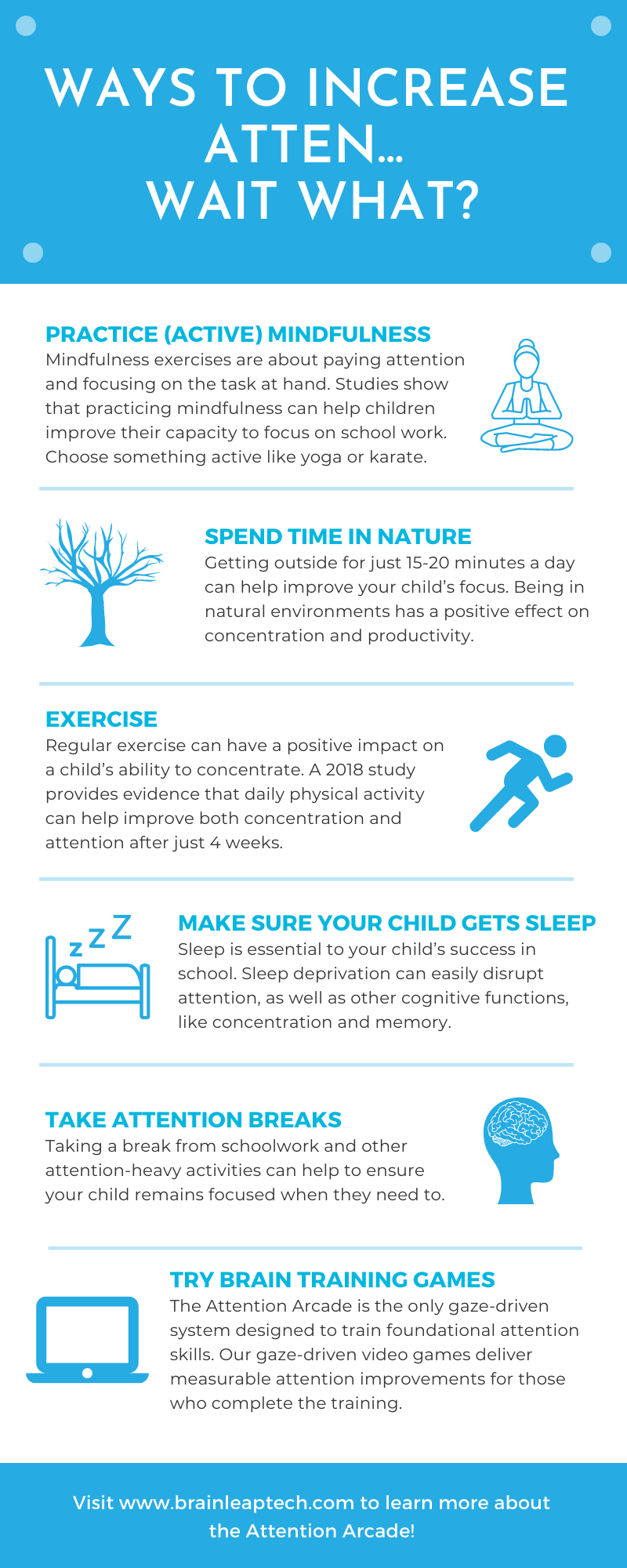Get Updates, Tips and Insights
Articles, stories and advice for parents and educators of kids who could use a little help paying attention.
LINKS
CONTACT INFO
HOURS
Mon – Fri: 8:00AM – 6:00PM
Sat – Sun: Closed
The transition to remote learning this past year has been a challenge for many families. Getting your child up and ready for school in your house seems somehow even more difficult than when they had to get to school!
If you’re a parent, working from home with your kids can make things even more difficult. Making sure they stay focused on the teacher, do their homework, and let’s be honest, even logging into Zoom can take hours of your day. So what can you do to keep them engaged with their school work?
Whether your child is in first grade or seventh grade, the importance of attention remains the same. Lack of attention can make learning extremely difficult for everyone, especially children. As children continue to navigate new learning environments, whether at home or in-person, it’s important to help them improve their attention in any way you can.
At BrainLeap, we believe in the ability to naturally increase your child’s attention. Because of this, we’re providing a list of a few things you can start doing to help your child focus.

Mindfulness exercises are all about paying attention and focusing on the task at hand. Studies show that practicing mindfulness can help children improve their ability to focus on school work.
While most people think practicing mindfulness consists of simply sitting quietly and focusing on their breath, it can be active as well! Activities such as yoga, ballet, and karate, are effective ways to practice active mindfulness. All of these activities aim to quiet the mind and tune into your breath, your bodily sensations, and the present moment.
Practicing mindfulness actually rewires your brain to find better ways to handle tasks and cope with stress and emotions. Research shows that mindfulness increases gray matter in the brain, which holds most of the brain cells within your brain. The increase in density of gray matter can lead to an increase in connectivity between cells.
Getting outside for just 15-20 minutes a day can help improve your child’s focus. Being in natural environments has a positive effect on concentration and productivity. Even just including plants in your child’s workspace can satisfy this need.
Scientists have found evidence that being in nature has a profound impact on our brains and our behavior. It helps to reduce anxiety and stress and increase attention capacity, creativity, and our ability to connect with others.
Regular exercise can have a positive impact on a child’s ability to concentrate. A study performed in 2018 illustrates evidence that daily physical activity can help improve both concentration and attention after just 4 weeks!
Implementing physical activity into a child’s daily routine doesn’t have to be challenging. There are plenty of team sports they can be a part of. If sports aren’t their thing, try encouraging them to bike, run or swim.
Sleep is essential to your child’s success in school. Sleep deprivation can easily disrupt attention, as well as other cognitive functions, like concentration and memory. Regular sleep deprivation may begin to affect your child’s mood and performance in school.
Your child should be getting at least 7-8 hours of sleep every night. Here are a few quick tips to help improve your child’s (and your own) sleep:
Taking a break from schoolwork and other attention-heavy activities can help to ensure your child remains focused when they need to. While this may seem counterintuitive, it really does work! The Pomodoro technique further illustrates this idea.
The Pomodoro technique is a time management technique that encourages people to work with the time they have, rather than against it. This technique encourages children and adults alike to break up their workload into 20-25 minutes chunks separated by 5-minute breaks. Even just a 5-minute breather can help increase focus during the time needed to complete tasks.
While all of the methods listed above can help with attention, none are specifically designed to train attention skills. The Attention Arcade is designed specifically to train foundational attention skills.
Our gaze-driven (that means you control them with only your eyes) video games deliver measurable attention improvements for those who complete the training. Just 20 minutes a day, 3-5 times of training attention skills can improve focus, concentration, and executive functioning. It’s exercise for your brain!
Articles, stories and advice for parents and educators of kids who could use a little help paying attention.
Mon – Fri: 8:00AM – 6:00PM
Sat – Sun: Closed

 Top Take Home Activities for Occupational Therapists
Top Take Home Activities for Occupational Therapists